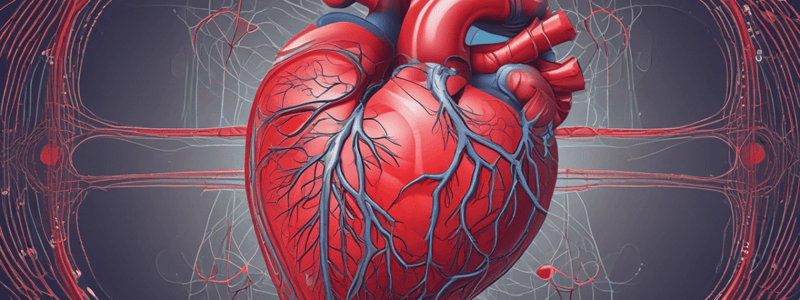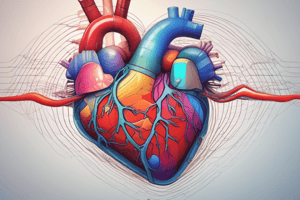Podcast
Questions and Answers
What does the QRS wave represent electrically and mechanically?
What does the QRS wave represent electrically and mechanically?
- Ventricular relaxation/repolarization
- Ventricular contraction/depolariation (correct)
- Atrial contraction/depolariation
- Atrial relaxation/repolarization
What intrinsic variables influence heart rate?
What intrinsic variables influence heart rate?
- Conduction system and auto-regulation
- Functional syncytium and auto-regulation
- Conduction system and functional syncytium (correct)
- Starling mechanism and functional syncytium
What effect does acetylcholine have on the cardiovascular system?
What effect does acetylcholine have on the cardiovascular system?
- Increase stroke volume
- Increase heart rate
- Decrease blood pressure
- Decrease heart rate (correct)
What happens during phase 0 of the myocyte action potential?
What happens during phase 0 of the myocyte action potential?
What is the effect of ADH/AVP on blood volume and vascular diameter?
What is the effect of ADH/AVP on blood volume and vascular diameter?
What is the effect of stimulating a beta-1 receptor?
What is the effect of stimulating a beta-1 receptor?
What is preload in the cardiovascular system?
What is preload in the cardiovascular system?
What physiological agent can act as both a chronotrope and an inotrope?
What physiological agent can act as both a chronotrope and an inotrope?
What is the physiologic variable that has the greatest effect on the resistance to blood flow?
What is the physiologic variable that has the greatest effect on the resistance to blood flow?
What would be the effect of TPR Vasoconstriction on Muscular Artery BP?
What would be the effect of TPR Vasoconstriction on Muscular Artery BP?
Which hormone can cause vasodilation due to the presence of beta-2 receptors?
Which hormone can cause vasodilation due to the presence of beta-2 receptors?
What is the effect of alpha 1 receptors on total peripheral resistance beds?
What is the effect of alpha 1 receptors on total peripheral resistance beds?
Which of the following local factors can cause vasodilation?
Which of the following local factors can cause vasodilation?
What is Poiseuille's Equation?
What is Poiseuille's Equation?
What is the primary effect of increased preload on the heart?
What is the primary effect of increased preload on the heart?
Which nervous system tends to increase heart rate and contractility?
Which nervous system tends to increase heart rate and contractility?
What is the term for the resistance to blood flow in the arteries?
What is the term for the resistance to blood flow in the arteries?
What is the effect of increased afterload on the heart?
What is the effect of increased afterload on the heart?
Which of the following is an extrinsic factor that affects stroke volume?
Which of the following is an extrinsic factor that affects stroke volume?
What does TPR stand for?
What does TPR stand for?
Which hormone increases sodium absorption in the kidney, leading to an increase in blood volume and blood pressure?
Which hormone increases sodium absorption in the kidney, leading to an increase in blood volume and blood pressure?
What is the effect of Angiotensin II on vascular constriction and blood pressure?
What is the effect of Angiotensin II on vascular constriction and blood pressure?
What is the effect of Nitric Oxide on vascular diameter and tissue perfusion?
What is the effect of Nitric Oxide on vascular diameter and tissue perfusion?
Which hormone increases vasoconstriction and blood pressure through the stimulation of the sympathetic nervous system?
Which hormone increases vasoconstriction and blood pressure through the stimulation of the sympathetic nervous system?
What is the effect of Renin on blood pressure and renal perfusion?
What is the effect of Renin on blood pressure and renal perfusion?
What is the effect of Anti-Diuretic Hormone on blood pressure and vascular constriction?
What is the effect of Anti-Diuretic Hormone on blood pressure and vascular constriction?
Flashcards are hidden until you start studying
Study Notes
Cardiac Conduction and Physiology
- The P wave represents atrial contraction/depolariation
- The QRS wave represents ventricular contraction/depolariation
- The T wave represents ventricular relaxation/repolarization
Intrinsic Variables Affecting Heart Rate
- Conduction system
- Functional syncytium
Intrinsic Variables Affecting Stroke Volume
- Auto-regulation (Starling mechanism)
Neurotransmitters and CV System
- Acetylcholine: decreases heart rate
- ADH/AVP: increases blood volume and decreases vascular diameter (vasoconstriction)
- Beta-1 receptor stimulation: increases heart rate and increases contractility
- Epinephrine: acts as both a chronotrope and an inotrope
Myocyte Action Potential
- Phase 0: rapid influx of Na+ via voltage-gated channels
- Phase 3: closing of Ca++ voltage-gated channels and efflux via open K+ voltage-gated channels
Cardiac Function
- Preload: venous return to the heart, can be modified by movement of the body
Blood Pressure Regulation
- TPR vasoconstriction: increases muscular artery blood pressure by decreasing vessel diameter
Total Peripheral Resistance
- Total Peripheral Resistance (TPR) is affected by arterioles
- Vascular diameter has the greatest effect on resistance to blood flow
Poiseuille's Equation and Bernoulli's Principle
- Poiseuille's Equation: Q = ∆P/R
- Bernoulli's Principle:
- KE (Kinetic Energy): pressure of blood moving forward
- PE (Potential Energy): blood pressure on walls of vessels
- The total energy of the system is conserved, meaning that as one increases, the other decreases
TPR Vasoconstriction and Vasodilation
- TPR Vasoconstriction increases Muscular Artery Blood Pressure
- TPR Vasodilation decreases Muscular Artery Blood Pressure
Hormonal Regulation of Vasoconstriction and Vasodilation
- Hormones that cause Vasoconstriction:
- Angiotensin II (Ag II)
- Arginine-vasopressin (ADH/AVP)
- Norepinephrine and Epinephrine (in some blood vessels)
- Hormones that cause Vasodilation:
- Epinephrine (due to beta-2 receptors)
- Local/autonomic factors that cause Vasodilation:
- CO2
- Lactate
- NO
Autonomic Receptors and Cardiovascular Effects
- Alpha 1 receptors: Vasoconstriction in TPR beds
- Alpha 2 receptors: inhibit NE release
- Beta 1 receptors: increased Heart Rate and Contractility
- Beta 2 receptors: Vasodilation in TPR beds
Starling Mechanism and Cardiovascular Regulation
- Conduction System: CO = Heart Rate x Stroke Volume
- Extrinsic variables that affect Heart Rate:
- Parasympathetic and Sympathetic Nervous Systems
- Intrinsic variables that affect Stroke Volume:
- Auto-Regulation/Starling Mechanism
- Extrinsic variables that affect Stroke Volume:
- Sympathetic Nervous System
- Preload and Afterload
Preload and Afterload
- Preload: Venous return to the heart
- Effect of Preload on the heart: increased contractile force
- Modification of Preload: increased Venous return
- Afterload: Force of blood already in arteries, constituting Resistance to output
- Effect of Afterload on the heart: increased Resistance to output
- Modification of Afterload: decreased Resistance to output
TPR and Cardiovascular Dynamics
- TPR (Total Peripheral Resistance) represents the resistance to blood flow in the arterioles
- Acetylcholine (ACh): decreases Heart Rate through Parasympathetic Activation
- Aldosterone (ALD): increases Na+ Absorption at the kidney, leading to increased Blood Volume and Blood Pressure
- Angiotensin II (AGII): increases Vasoconstriction, leading to increased Blood Pressure
- Atrial Natriuretic Peptide (ANP): increases Na+ Loss at the kidney, leading to decreased Blood Volume and Blood Pressure
- Anti-Diuretic Hormone (ADH/AVP): increases H2O Absorption at the kidney, leading to increased Blood Volume and Blood Pressure
- Epinephrine (EP): increases Vasoconstriction and Heart Rate, leading to increased Blood Pressure
- Renin: increases Conversion of Angiotensinogen, leading to increased Blood Pressure
- Nitric Oxide (NO): increases Vasodilation, leading to increased Tissue Perfusion
Studying That Suits You
Use AI to generate personalized quizzes and flashcards to suit your learning preferences.




